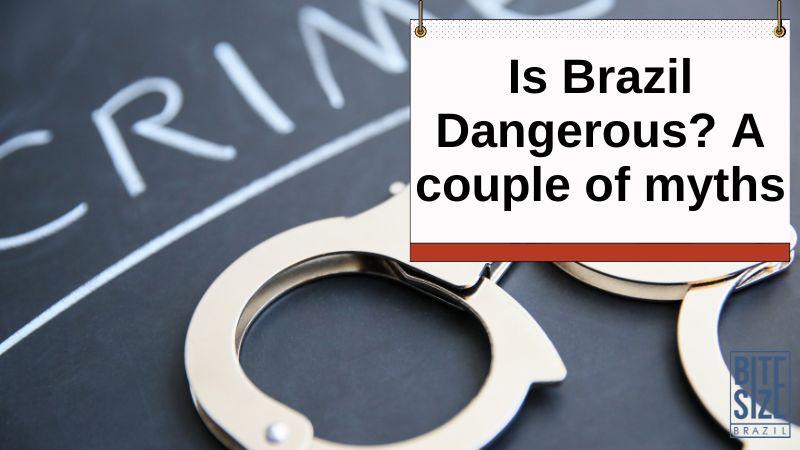While it's true that Brazil has a reputation for being dangerous, the reality is more nuanced than the headlines suggest. This blog post will explore the facts and offer tips for staying safe in Brazil.
And quick caveat:
Although I am Brazilian and knowledgeable about my country's culture, I am only one person. My experience is limited compared to such a big country and its population. You should always do your due diligence before accepting my views and opinions.
Overview of Brazil's reputation as a dangerous country
Brazil has a reputation as a dangerous country, and as a Brazilian, I have to say: with good reason.
It is home to some of the most violent cities in the world, and its crime rate is one of the highest in Latin America. The country is plagued by gangs, drug trafficking, and organized crime, contributing to its reputation as dangerous.
It would be great to say that it plagues only cities. But unfortunately, the countryside also suffers.
The town where I come from was riddled with street violence, drug traffickers living in the house next door, and police officers who did little to nothing to help.
The image I'm painting is quite bleak, I admit. But don't let that put you down.
Despite its reputation as a dangerous country, Brazil is still home to many beautiful things. Its vibrant culture, stunning beaches, and beautiful rainforests make it an attractive tourist destination.
However, visitors should always exercise caution when traveling in Brazil and take the necessary precautions to ensure their safety.
A few things you should understand before embarking on a plane to Brazil
Traveling to Brazil can be an exciting and rewarding experience, as many of my students have told me. Still, it is essential to understand the realities of the destination before making a move.
And now, we will explore some of those realities and the myths involved.
Next time you come here, you'll have made an informed decision.
Myth #1: Brazil is overwhelmingly violent.
When I started having Spanish lessons, I had a Venezuelan teacher. At the time, I lived in my hometown, and my neighbors raised chickens. My teacher heard the chicken making noise in the background over our Skype call. She looked puzzled and asked me, "Do you live in the Amazon? Are there monkeys in your neighborhood?"
I said I didn't live in the Amazon. But in fact, there were monkeys in our neighborhood.
She asked me that question right around the time when Sylvester Stallone said that everyone in Brazil had a monkey to gift tourists.
And the sad fact is, even some Brazilians have those misconceived ideas about our country, not only our culture but facts and violence.
One of the most common misconceptions is that crime rates in Brazil are incredibly high.
While it is true that Brazil has a higher rate of violent crime than many other countries, the overall crime rate is lower than many other countries in Latin America, including popular destinations such as Mexico.
Another misconception about crime in Brazil is that it is rampant and out of control. While it is true that there are some areas with higher crime rates than others, there are some facts you should keep in mind.
First, most gun violence and violent crimes are related to gang wars. Unfortunately, many innocent people fall victim to this, but this crime is less likely to happen to tourists.
As a tourist, you're less likely to go to dangerous areas. Of course, if you go to tourist spots and don't exercise caution, you might be a victim of some petty crime. Pickpocketing, armed robbery, and theft, in general, are common in such places as beaches and streets.
Also, crime rates vary from state to state. My state of residence is one of the most violent, number-wise.
Depending on when you come here, though, you might feel you are in a different country than I am describing.
Especially in Salvador, if you come here during high season, you’ll likely see a police officer on every corner. That's because it's tourist season, and because this city's economy hinges on tourism and commerce, the local administration will do everything possible to protect tourists during this time.
During low season, though, it's just as dangerous as any other place.
Myth #2: Brazilian cities are all slums and poverty.
Brazil is a country that has been historically associated with poverty and slums, and "slums are synonym to violence and crime" — which is not true in its entirety.
(If you watch the movie "City of God" and don't know the first thing about Brazil, you'll likely think it's hell over here.)
The truth is that Brazil has made significant strides in recent years to reduce poverty and improve living conditions for its citizens.
The slums of Brazil, known as favelas, have been a source of stigma for the country for decades. However, the favelas are not as impoverished and dangerous as they once were.
I mean, it's not Wonderland over there, but many have developed over the years and are not the way they were when they first boomed mid 1900s.
The favelas have also dramatically transformed in recent years through government initiatives, infrastructure improvements, and social programs. Some favelas, like Rocinha, are a complete system themselves.
The poverty rate in Brazil has also decreased significantly since the early 2000s. In 2002, Brazil had a poverty rate of 47.3%, but by 2015 that number had dropped to 25.3%. This is mainly due to increased investment in social programs such as Bolsa Família, which provides financial assistance to low-income families.
And I chose precisely that period to talk about because, after the events of 2016 up to last year, nothing worked as it should in this country.
Precautions that travelers and residents can take to stay safe.
I was watching an episode of South Park these days, the one where Cartman inherits $1 million. He decides to go to the bank to withdraw every last dollar bill he is entitled to. He carries the money outside in a wheelbarrow.
What happens in that episode is not germane to this discussion, but my only thought when I saw the episode was, "If it happened in Brazil, he would have been robbed as soon as he left the bank."
And many tourists come to Brazil with this kind of a Cartman mindset, where you can carry all of your valuables in an imaginary wheelbarrow — jewelry, expensive iPhones, wallets — thinking no one's noticing.
Only carry large amounts of cash or jewelry or leave wallets or purses in plain sight. Consider bringing a dummy wallet with a few small bills in case of theft. Also, keep copies of your essential documents in a secure place, such as a hotel safe or a locked suitcase.
By the way, being robbed in Brazil has become so common that many people have what we call the robber's phone — a worn-out phone you give to a robber while you keep your actual phone in safety.
Make sure you know where you're going — and that includes not trusting Waze or other GPS navigation systems
There has been more than one accident where people enter areas they shouldn't have [in Portuguese]. If you rent a car to drive around the town, know exactly where you are going.
The most important precaution is to stay aware of your surroundings and keep your wits about you.
If you're driving somewhere and you see that the streets are deserted, and people look at you funnily — in the sense that they are asking themselves, "what is this person doing here?" — trust your instincts and move away from the situation.
It is also wise to research the area you visit, including crime rates and potential safety risks.
Finally, it is crucial to stay connected. Make sure family and friends know your plans and have contact information for you in an emergency.
Carry a cell phone with you always and consider purchasing a local SIM card for international travel. Additionally, consider registering with your country's embassy or consulate so that they can assist you if needed.
By following these simple precautions, you can ensure that your experience in Brazil is both enjoyable and safe.
In Conclusion
Is Brazil dangerous?
Yes.
Is it extremely dangerous?
In some places, yes.
Is it so dangerous that no tourists can enjoy their stay here?
Obviously not.
While Brazil has a reputation for being a dangerous country, the reality is more nuanced than the headlines suggest.
Travelers and residents can take specific precautions to stay safe, including not carrying large amounts of cash or jewelry, staying aware of their surroundings, and researching potential safety risks. By following these simple precautions, visitors can ensure that their experience in Brazil is both enjoyable and safe.
Despite its challenges, Brazil remains a vibrant and dynamic country with a rich cultural heritage and beautiful natural landscapes.
You'll (probably) love your stay here.
And if you've been to Brazil before, what has your experience been like? Please share it with me in the comments below.

